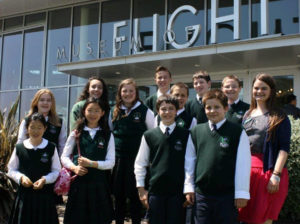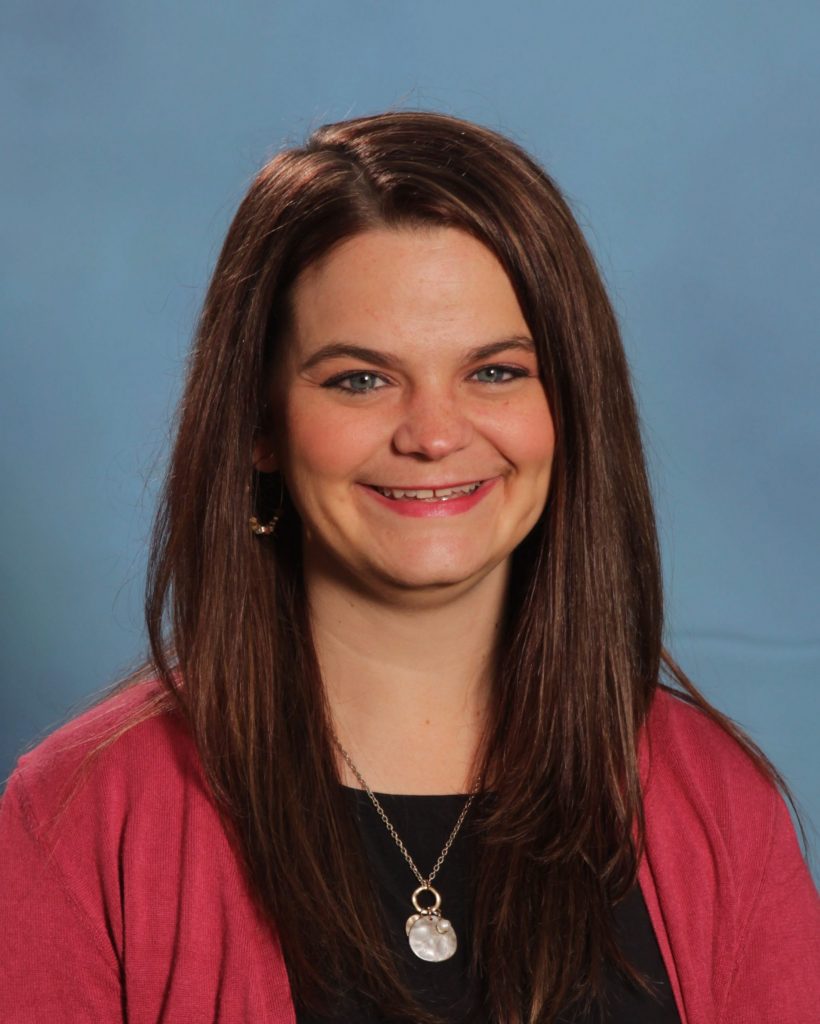Someone who was not a teacher once looked at one of my lesson plans and asked a bit skeptically, “Do you plan out every minute of every class, and does it really go the way you have it written down here?” I laughed before I responded because, yes, I do plan out nearly every minute of my day, but no, lessons most certainly do not go the way I have planned on paper. “So what is the point?” was his natural next question (a question I often ask myself). Well, the point is to be prepared: I have lesson plans; I have curriculum; I have certain skills and concepts the students must learn before they leave sixth grade. I must give tests, homework, and grades. That is all a part of school, and those are all good things. Providence teachers, however, go far beyond lesson plans, homework, and grades during a school day. Every subject the students study, skill they master, and fact they memorize has one ultimate goal: to teach the students their purpose in this world, thus revealing to them their identity.
We all need a purpose. Without purpose, we wander aimlessly through the day, dissatisfied with ourselves and our surroundings. The first question in the Westminster Shorter Catechism asks, “What is man’s chief end?” This comes first because it is the foundation on which everything else is laid; it is the compass that points the ship north. Purpose brings meaning and definition to our existence. Our identity is rooted in our purpose. The WSC answers the question by saying, “Man’s chief end is to glorify God and enjoy Him forever.” My purpose as a teacher and the purpose of each student who comes through my classroom is to glorify God through our words, actions, thoughts, and deeds and to learn to enjoy Him more and more each day.
 Each subject helps us to learn that God is a purposeful God who created the world and the people in it on purpose and for a purpose. Math shows us the order, structure, and rules that govern the world around us, affecting the plants, the planets, and our own bodies. Science shows us the incredible detail, awe-inspiring immensity, and complicated workings of God’s creation. If God created the rocks, waters, animals, planets, and numbers to each serve a purpose, how much more intentionality and identity did He give to man, to the part of His creation made in His own image? History and literature provide us with example after example of men, women, and children who played a role in the story of God’s world. These people were born just as insignificant to the world at large as I was and as my students were, but history consistently demonstrates that God has a purpose for each individual whether he is named in a textbook or not. But of course, as a teacher, I must defend requiring students to study math, science, history, literature, and the rest. While I believe that the act of studying and learning is glorifying to God and that the studies themselves help us better understand our identity and purpose, my ultimate goal as a sixth grade teacher is not that my students should know the dates for the Civil War, have read The Adventures of Tom Sawyer, be ready to list the most common phyla of animals, or be able to multiply numbers with decimal points. My ultimate goal is not even that they grow in their walk with God or become better people. I teach at Providence because I believe my purpose is to show students the greatness and wonder, majesty and power, terrible fierceness and tender love of God.
Each subject helps us to learn that God is a purposeful God who created the world and the people in it on purpose and for a purpose. Math shows us the order, structure, and rules that govern the world around us, affecting the plants, the planets, and our own bodies. Science shows us the incredible detail, awe-inspiring immensity, and complicated workings of God’s creation. If God created the rocks, waters, animals, planets, and numbers to each serve a purpose, how much more intentionality and identity did He give to man, to the part of His creation made in His own image? History and literature provide us with example after example of men, women, and children who played a role in the story of God’s world. These people were born just as insignificant to the world at large as I was and as my students were, but history consistently demonstrates that God has a purpose for each individual whether he is named in a textbook or not. But of course, as a teacher, I must defend requiring students to study math, science, history, literature, and the rest. While I believe that the act of studying and learning is glorifying to God and that the studies themselves help us better understand our identity and purpose, my ultimate goal as a sixth grade teacher is not that my students should know the dates for the Civil War, have read The Adventures of Tom Sawyer, be ready to list the most common phyla of animals, or be able to multiply numbers with decimal points. My ultimate goal is not even that they grow in their walk with God or become better people. I teach at Providence because I believe my purpose is to show students the greatness and wonder, majesty and power, terrible fierceness and tender love of God.
 In the last year, I came across this quotation commonly attributed Antoine de Saint-Exupery, the author of The Little Prince. He said, “If you want to build a ship, don’t drum up people to collect wood and don’t assign them tasks and work, but rather teach them to long for the endless immensity of the sea.” Very early on, Providence students learn the answer to the first question of the Westminster Shorter Catechism. It is not uncommon in grammar assemblies to hear the students recite, “Man’s chief end is to glorify God and to enjoy Him forever.” But reciting those words—even understanding the meaning of the words—is a long way away from designing our lives around them, from making every choice based on whether or not it is glorifying to God, from building our identity based on that purpose. I think that if we humans longed for the endless immensity that is God, if we knew and never forgot or doubted God’s awesome power, His terrible greatness, and His immense love for us, we would not want to do anything but glorify Him all the days of our lives.
In the last year, I came across this quotation commonly attributed Antoine de Saint-Exupery, the author of The Little Prince. He said, “If you want to build a ship, don’t drum up people to collect wood and don’t assign them tasks and work, but rather teach them to long for the endless immensity of the sea.” Very early on, Providence students learn the answer to the first question of the Westminster Shorter Catechism. It is not uncommon in grammar assemblies to hear the students recite, “Man’s chief end is to glorify God and to enjoy Him forever.” But reciting those words—even understanding the meaning of the words—is a long way away from designing our lives around them, from making every choice based on whether or not it is glorifying to God, from building our identity based on that purpose. I think that if we humans longed for the endless immensity that is God, if we knew and never forgot or doubted God’s awesome power, His terrible greatness, and His immense love for us, we would not want to do anything but glorify Him all the days of our lives.
So in the day-in and day-out routine of lesson planning, correcting papers, or teaching grammar lessons, I have to keep in mind that if I do not teach my students to long for the endless immensity of the sea—if I do not use each lesson to show them one more aspect of God—then I will have missed my calling. My purpose as their teacher is to point them to good, true, and beautiful things that will give them purpose and solidify their identity as image bearers of God. Because of this, there are times when my lesson plans for that day or even that week are set aside because a student has discovered an attribute of God in some side note of our history lesson that demands our full attention. Some days, it is more important to spend an hour (of what was supposed to be a half hour writing lesson) sharing book suggestions with the students and finding out what they are reading because they will learn more about the nature of God through their own reading than I could ever teach them in that half hour of writing. I will continue to do lesson planning because it has its purpose, but I will continue also to hold those plans loosely as I seek to teach sixth graders who God is and what He has done for us.
